Books
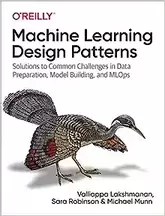
Valliappa Lakshmanan, Sara Robinson, Michael Munn, Machine Learning Design Patterns, O'Reilly Media, Inc. 2021 ISBN: 9781098115784
The design patterns in this book capture best practices and solutions to recurring problems in machine learning. The authors catalog the first tried-and-proven methods to help engineers tackle problems that frequently crop up during the ML process. These design patterns codify the experience of hundreds of experts into advice you can easily follow. The book describes 30 patterns for data and problem representation, operationalization, repeatability, reproducibility, flexibility, explainability, and fairness. Each pattern includes a description of the problem, a variety of potential solutions, and recommendations for choosing the most appropriate remedy for your situation.
[read online on Safari Books (O'Reilly media)]
[order on Amazon]
[Order on Google Play Books]
The design patterns in this book capture best practices and solutions to recurring problems in machine learning. The authors catalog the first tried-and-proven methods to help engineers tackle problems that frequently crop up during the ML process. These design patterns codify the experience of hundreds of experts into advice you can easily follow. The book describes 30 patterns for data and problem representation, operationalization, repeatability, reproducibility, flexibility, explainability, and fairness. Each pattern includes a description of the problem, a variety of potential solutions, and recommendations for choosing the most appropriate remedy for your situation.
[read online on Safari Books (O'Reilly media)]
[order on Amazon]
[Order on Google Play Books]
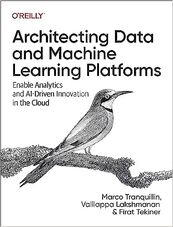
Marco Tranquillin, Valliappa Lakshmanan, Firat Tekiner, Architecting Data and Machine Learning Platforms: Enable Analytics and AI-Driven Innovation in the Cloud, O'Reilly Media, Inc. 2023. ISBN: 978-1098151614
All cloud architects need to know how to build data platforms—the key to enabling businesses with data and delivering enterprise-wide intelligence in a fast and efficient way. This handbook is ideal for learning how to design, build, and modernize cloud native data and machine learning platforms using AWS, Azure, Google Cloud, or multicloud tools like Fivetran, dbt, Snowflake, and Databricks.
Authors Marco Tranquillin, Valliappa Lakshmanan, and Firat Tekiner cover the entire data lifecycle in a cloud environment, from ingestion to activation, using real-world enterprise architectures. You'll learn how to transform and modernize familiar solutions, like data warehouses and data lakes, and you'll be able to leverage recent AI/ML patterns to get accurate and quicker insights to drive competitive advantage.
[Order on Amazon]
All cloud architects need to know how to build data platforms—the key to enabling businesses with data and delivering enterprise-wide intelligence in a fast and efficient way. This handbook is ideal for learning how to design, build, and modernize cloud native data and machine learning platforms using AWS, Azure, Google Cloud, or multicloud tools like Fivetran, dbt, Snowflake, and Databricks.
Authors Marco Tranquillin, Valliappa Lakshmanan, and Firat Tekiner cover the entire data lifecycle in a cloud environment, from ingestion to activation, using real-world enterprise architectures. You'll learn how to transform and modernize familiar solutions, like data warehouses and data lakes, and you'll be able to leverage recent AI/ML patterns to get accurate and quicker insights to drive competitive advantage.
[Order on Amazon]
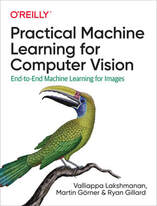
Valliappa Lakshmanan, Martin Gorner, Ryan Gillard, Practical Machine Learning for Computer Vision, O'Reilly Media, Inc, 2021 ISBN: 978-1098102364
Machine learning on images is revolutionizing healthcare, manufacturing, retail, and many other sectors. Many previously difficult problems can now be solved by training machine learning (ML) models to identify objects in images. Our aim in this book is to provide intuitive explanations of the ML architectures that underpin this fast-advancing field, and to provide practical code to employ these ML models to solve problems involving classification, measurement, detection, segmentation, representation, generation, counting, and more.
Image classification is the “hello world” of deep learning. Therefore, this book also provides a practical end-to-end introduction to deep learning. It can serve as a stepping stone to other deep learning domains, such as natural language processing.
You will learn how to design ML architectures for computer vision tasks and carry out model training using popular, well-tested prebuilt models written in TensorFlow and Keras. You will also learn techniques to improve accuracy and explainability. Finally, this book will teach you how to design, implement, and tune end-to-end ML pipelines for image understanding tasks.
[read online on Safari Books (O'Reilly media)]
[order on Amazon]
[order on Google Play books]
Machine learning on images is revolutionizing healthcare, manufacturing, retail, and many other sectors. Many previously difficult problems can now be solved by training machine learning (ML) models to identify objects in images. Our aim in this book is to provide intuitive explanations of the ML architectures that underpin this fast-advancing field, and to provide practical code to employ these ML models to solve problems involving classification, measurement, detection, segmentation, representation, generation, counting, and more.
Image classification is the “hello world” of deep learning. Therefore, this book also provides a practical end-to-end introduction to deep learning. It can serve as a stepping stone to other deep learning domains, such as natural language processing.
You will learn how to design ML architectures for computer vision tasks and carry out model training using popular, well-tested prebuilt models written in TensorFlow and Keras. You will also learn techniques to improve accuracy and explainability. Finally, this book will teach you how to design, implement, and tune end-to-end ML pipelines for image understanding tasks.
[read online on Safari Books (O'Reilly media)]
[order on Amazon]
[order on Google Play books]
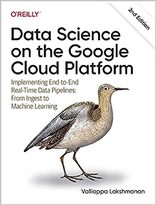
V Lakshmanan, Data Science on the Google Cloud Platform Edition 2, O'Reilly Media, Inc., 2022. ISBN: 978-1098118952
Learn how easy it is to apply sophisticated statistical and machine learning methods to real-world problems when you build using Google Cloud Platform (GCP). This hands-on guide shows data engineers and data scientists how to implement an end-to-end data pipeline with cloud native tools on GCP.
Throughout this updated second edition, you'll work through a sample business decision by employing a variety of data science approaches. Follow along by building a data pipeline in your own project on GCP, and discover how to solve data science problems in a transformative and more collaborative way.
[order on Amazon]
Learn how easy it is to apply sophisticated statistical and machine learning methods to real-world problems when you build using Google Cloud Platform (GCP). This hands-on guide shows data engineers and data scientists how to implement an end-to-end data pipeline with cloud native tools on GCP.
Throughout this updated second edition, you'll work through a sample business decision by employing a variety of data science approaches. Follow along by building a data pipeline in your own project on GCP, and discover how to solve data science problems in a transformative and more collaborative way.
[order on Amazon]
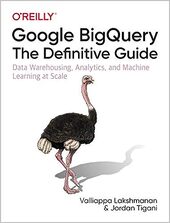
V. Lakshmanan and J. Tigani, Google BigQuery: The Definitive Guide: Data Warehousing, Analytics, and Machine Learning at Scale. O'Reilly Media, 2019. ISBN: 978-1492044468
Work with petabyte-scale datasets while building a collaborative, agile workplace in the process. This practical book is the canonical reference to Google BigQuery, the query engine that lets you conduct interactive analysis of large datasets. BigQuery enables enterprises to efficiently store, query, ingest, and learn from their data in a convenient framework. With this book, you’ll examine how to analyze data at scale to derive insights from large datasets efficiently.
Valliappa Lakshmanan, tech lead on Google Cloud Platform, and Jordan Tigani, engineering director for the BigQuery team, provide best practices in modern data warehousing within an autoscaled, serverless, public cloud. Whether you want to explore parts of BigQuery you’re not familiar with, or prefer to focus on specific tasks, this reference is indispensable.
[read online on Safari Books (O'Reilly media)]
[order on Amazon]
Work with petabyte-scale datasets while building a collaborative, agile workplace in the process. This practical book is the canonical reference to Google BigQuery, the query engine that lets you conduct interactive analysis of large datasets. BigQuery enables enterprises to efficiently store, query, ingest, and learn from their data in a convenient framework. With this book, you’ll examine how to analyze data at scale to derive insights from large datasets efficiently.
Valliappa Lakshmanan, tech lead on Google Cloud Platform, and Jordan Tigani, engineering director for the BigQuery team, provide best practices in modern data warehousing within an autoscaled, serverless, public cloud. Whether you want to explore parts of BigQuery you’re not familiar with, or prefer to focus on specific tasks, this reference is indispensable.
[read online on Safari Books (O'Reilly media)]
[order on Amazon]
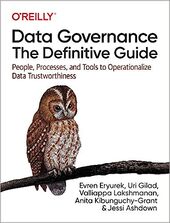
Evren Eryurek, Uri Gilad, Valliappa Lakshmanan, Anita Kibunguchy-Grant and Jessi Ashdown: Data Governance: The Definitive Guide: People, Processes, and Tools to Operationalize Data Trustworthiness. O'Reilly Media, 2021. ISBN: 978-1492063490
As you move data to the cloud, you need to consider a comprehensive approach to data governance, along with well-defined and agreed-upon policies to ensure your organization meets compliance requirements. Data governance incorporates the ways people, processes, and technology work together to ensure data is trustworthy and can be used effectively. This practical guide shows you how to effectively implement and scale data governance throughout your organization.
Chief information, data, and security officers and their teams will learn strategy and tooling to support democratizing data and unlocking its value while enforcing security, privacy, and other governance standards. Through good data governance, you can inspire customer trust, enable your organization to identify business efficiencies, generate more competitive offerings, and improve customer experience. This book shows you how.
[order on Amazon]
As you move data to the cloud, you need to consider a comprehensive approach to data governance, along with well-defined and agreed-upon policies to ensure your organization meets compliance requirements. Data governance incorporates the ways people, processes, and technology work together to ensure data is trustworthy and can be used effectively. This practical guide shows you how to effectively implement and scale data governance throughout your organization.
Chief information, data, and security officers and their teams will learn strategy and tooling to support democratizing data and unlocking its value while enforcing security, privacy, and other governance standards. Through good data governance, you can inspire customer trust, enable your organization to identify business efficiencies, generate more competitive offerings, and improve customer experience. This book shows you how.
[order on Amazon]
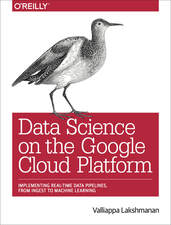
V Lakshmanan, Data Science on the Google Cloud Platform, O'Reilly Media, Inc., 2017. ISBN: 9781491974551
Learn how easy it is to apply sophisticated statistical and machine learning methods to real-world problems when you build on top of the Google Cloud Platform (GCP). This hands-on guide shows developers entering the data science field how to implement an end-to-end data pipeline, using statistical and machine learning methods and tools on GCP. Through the course of the book, you’ll work through a sample business decision by employing a variety of data science approaches. Follow along by implementing these statistical and machine learning solutions in your own project on GCP, and discover how this platform provides a transformative and more collaborative way of doing data science.
[read online on Safari Books (O'Reilly media)]
[order on Amazon]
[order on Google Play Books]
Learn how easy it is to apply sophisticated statistical and machine learning methods to real-world problems when you build on top of the Google Cloud Platform (GCP). This hands-on guide shows developers entering the data science field how to implement an end-to-end data pipeline, using statistical and machine learning methods and tools on GCP. Through the course of the book, you’ll work through a sample business decision by employing a variety of data science approaches. Follow along by implementing these statistical and machine learning solutions in your own project on GCP, and discover how this platform provides a transformative and more collaborative way of doing data science.
[read online on Safari Books (O'Reilly media)]
[order on Amazon]
[order on Google Play Books]
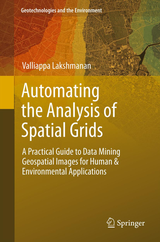
V. Lakshmanan, Automating the Analysis of Spatial Grids: A Practical Guide to Data Mining Geospatial Images for Human and Environmental Applications. Springer, 2012. ISBN: 978-94-007-4074-7.
The aim of this book is for readers to be able to devise and implement automated techniques to extract information from spatial grids such as radar, satellite or high-resolution satellite imagery or from any data is that can be placed on a spatial grid.The book is based off a course that I taught in Spring 2011 at the University of Oklahoma to a diverse group of graduate students from Computer Science, Meteorology and Environmental Engineering. It should be suitable as a textbook for upper-level undergraduate students and graduate students.
Even though the material developed out of a graduate course, this book is targeted primarily at practitioners i.e. people who need to solve a problem and are looking for ways to address it. Hence, the book forgoes detailed descriptions of theory and mathematical development in favor of more practical issues of implementation.
A software implementation in the Java programming language is included for nearly all the techniques discussed in this book.
[read online at Springer].
Order a $25 print copy of the book. This works only if you access it from an University IP address.
[Order on Amazon]
The aim of this book is for readers to be able to devise and implement automated techniques to extract information from spatial grids such as radar, satellite or high-resolution satellite imagery or from any data is that can be placed on a spatial grid.The book is based off a course that I taught in Spring 2011 at the University of Oklahoma to a diverse group of graduate students from Computer Science, Meteorology and Environmental Engineering. It should be suitable as a textbook for upper-level undergraduate students and graduate students.
Even though the material developed out of a graduate course, this book is targeted primarily at practitioners i.e. people who need to solve a problem and are looking for ways to address it. Hence, the book forgoes detailed descriptions of theory and mathematical development in favor of more practical issues of implementation.
A software implementation in the Java programming language is included for nearly all the techniques discussed in this book.
[read online at Springer].
Order a $25 print copy of the book. This works only if you access it from an University IP address.
[Order on Amazon]
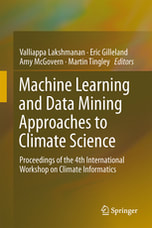
V. Lakshmanan, E. Gilleland, A. McGovern, and M. Tingley, eds., Machine Learning and Data Mining Approaches to Climate Science: Proceedings of the Fourth International Workshop on Climate Informatics. Springer, 2015.
This is an edited volume of contributed papers that arose out of Climate Informatics 2014. I was program chair of this conference, and this was the first year that we were able to put together such a collection of papers representing the state of the science.
[read online at Springer].
This is an edited volume of contributed papers that arose out of Climate Informatics 2014. I was program chair of this conference, and this was the first year that we were able to put together such a collection of papers representing the state of the science.
[read online at Springer].

